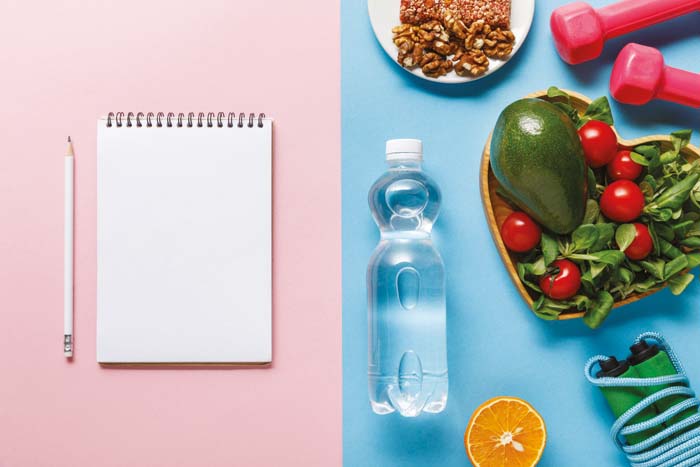SPONSORED BY AMERICAN SCHOOL OF DOHA
The start of the school year has come and gone, and since then, so have many other events. It is hard to believe that so much time has passed! As we have been in school for most of the first semester now, it is a good time to check-in with ourselves.

Keeping Your Table Stable
When getting to know students, I often teach a simple strategy to help them check-in with themselves by focusing on four key areas of their health: hydration, nutrition, exercise, and sleep. I ask students: “How are you doing keeping your table stable?” I explain that there are four legs to a table, and you need all of the legs to keep the “table stable”. No leg is any more or less important than the other legs, and all are needed to stay balanced. Keeping the table stable is necessary to give ourselves the best chance to not just survive, but to thrive, personally and intellectually.
Questions to Help with Each Leg
- Hydration: ask yourself what you know about the benefits of staying hydrated. For instance, did you know that drinking enough water helps to keep your brain functioning at its best? Do you bring a water bottle to school? How often do you refill it? Do you slowly sip water throughout the day?
- Nutrition: eating a balanced, varied diet also helps you stay alert and energised. So, what foods do you like to eat? And do you know what types they are—carbohydrates, proteins, fats, fruits, or vegetables? Do you make sure to eat regular meals and snacks?
- Exercise: exercise does not only make our bodies strong, but it also helps us stay focused and keeps us active. How do you like to stay active? Do you like to get moving with your family? What activities would you like to try?
- Sleep: getting enough sleep helps us stay refreshed and able to do the things we enjoy. To help you stay on track, ask yourself the following: What time do you go to bed, and what time do you wake up? Do you fall asleep easily? Do you know what REM sleep is and why it’s important? Did you know that some apps can help you sleep better? Your parents can help you out with the last two.
TIP: If you’re struggling to fall asleep, instead of counting sheep, why not use the A to Z Gratitude Strategy? All you need to do is name a person, place, or thing you are grateful for using each letter of the alphabet. (I have yet to make it past the letter “L” when I use this myself!)
Get to Know Yourself
Check-in with yourself once a week to see how you are doing and make adjustments where necessary. Ask someone to help hold you accountable—a parent, a teacher, a coach, a counsellor, or another trusted adult in your life. Determine if you need to share with anyone, get help from anyone, take action, or rebalance things.
Most of us spend a lot of time believing that the thing that is making it difficult for us to learn or is creating stress in our lives is something outside of ourselves. We tend to think that our problems relate to family, friends, schoolwork, or extracurricular activities. But we rarely stop and check the basics. Keeping our table stable will truly enable us to function at our best, to learn more about ourselves, and to enjoy our lives more. It gives us a head start and promotes resilience. Instead of getting frustrated, try checking to see if your table is stable. Once you’ve checked in with yourself, try to also see how your family members and friends are doing.
Other Self-care Strategies
- Make adequate time for yourself by scheduling enough breaks throughout the day and taking time to do things you enjoy.
- Remember that it is okay to say “no”.
- Don’t isolate yourself, but also keep in mind that spending some alone time to practise self-care is a good thing.
- Watch out for warning signs. These include instances when people cross the limits in their behaviour with you. Other warning signs to look for: needing to numb your feelings; finding it difficult to focus on tasks; always feeling bored, tired, or burnt out; missing assignments.
- Seek out professional counselling or therapy for support.
- You can also use the resources available at your school to get help by getting support from teachers, counsellors, coaches, and nurses. If possible, join peer support groups with people your age so you can relate to people who might be going through the same things.
- Accept that you are human and someone who needs help sometimes. We are all works in progress. Do not try to be perfect, have it all, or do it all. Know your limits and be realistic.
Strong Transitions, Safe Transitions
Each year you will experience transitions in life, and you may need support when they happen. These changes can feel overwhelming, along with all the other things happening in your life. If you need help adapting to these changes, please do not be afraid to reach out to your school counsellors—we are here to help!
Jen Hammonds is a middle school counsellor at the American School of Doha (ASD), where she has worked for the past ten years. She is originally from Houston, Texas and received her Bachelor of Science in English and Secondary Education from Vanderbilt University. After receiving her Masters in Counseling, she worked as a learning specialist at Hong Kong International School for several years before moving to Qatar. Jen is married to James Hammonds, who teaches fifth grade at ASD, and they have two daughters, Ashley (20) and Sydney (19), who also graduated from ASD. Jen loves being a counsellor and supporting students and families in Qatar. To learn more about Jen’s work at ASD, visit the school’s website at asd.sch.qa.